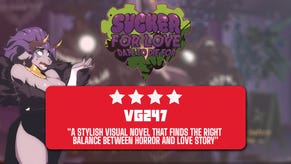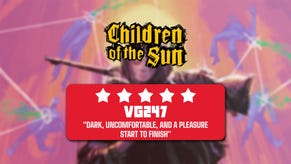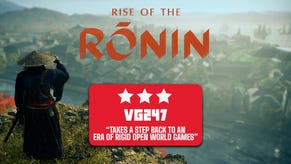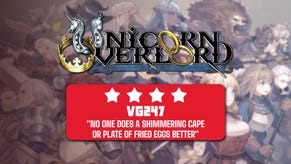Miitopia Review: Tomodachi Lite
Miitopia's charm wears out quick, and saves the best for last.
This article first appeared on USgamer, a partner publication of VG247. Some content, such as this article, has been migrated to VG247 for posterity after USgamer's closure - but it has not been edited or further vetted by the VG247 team.
There was a time when I played Tomodachi Life every day. It was like clockwork, embedded into my routine. I'd wake up, flip open my 3DS, and check on Kanye West and his karaoke career. I'd go to bed, flip open my 3DS, and check on a doomed love triangle that I knew would end in someone getting heartbroken.
My virtual apartment complex of Miis was built of anime characters, real life friends, celebrities, and so on. It was a disorienting mix, but the randomness of it all was part of the fun. Tomodachi Life wasn't so much a game you actively played, but a game where you played as a higher being. You were effectively a Mii God. You created these people, but you had little control over them. They forged their own paths, friendships, romances; and you were just along for the ride. Tomodachi Life was hilarious too, as the situations Miis would stumble into continuously shot to nuclear heights.
Miitopia, Nintendo's new JRPG parlay with Miis driving the action, doesn't really recapture the charming spirit of Tomodachi Life. When I described the opening hours to a co-worker, I called it "Tomodachi Life without the humor." Luckily in the dozens of hours since I said that, it's definitely improved. But with improvement came a new fault: repetition.
Where Tomodachi Life was once varied and unpredictable, Miitopia quickly becomes the opposite. Its charms lie in casting the major roles of this JRPG epic—a tale where an evil dark lord steals the faces of others, my dark lord is Mii Hank Hill—and little else. The accidental surprises and natural hilarity appear in astoundingly small doses in the surprisingly vast world of Miitopia. I was surprised that after seeing one heartwarming goof, I ended up seeing it many more times over.
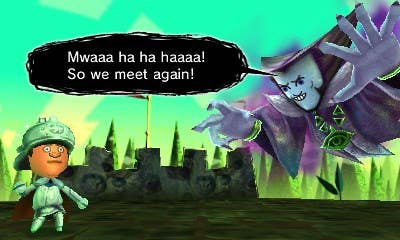
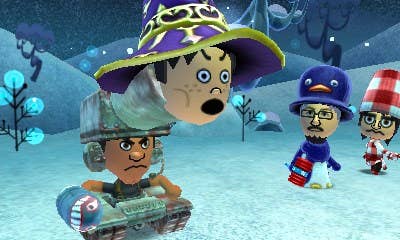
There are bits of the Tomodachi Life DNA that have carried over to Miitopia. The closest the game gets to it is in the context of Inns. In Miitopia, quite a bit of time is spent at Inns. Inns are where Miis rest for the night, restoring their HP and MP after a long road of battles. Inns are also where they wish for items, items like HP bananas, MP candy, and miscellaneous outfits and gear. There are no shops in Miitopia: so hoping for your Mii to wish for something new is your only hope for a new weapon or armor. While cute at first glance, it feels all too prohibitive for a JRPG.
That's not to say Miitopia doesn't have its moments. When resting at an incredibly-frequent Inn, you have the ability to pair up miscellaneous Miis and watch their relationship grow. Sometimes it becomes romantic, sometimes not. It's all depending on how much time they spend together. The Miis, much like they did in Tomodachi Life, do have thoughts of their own. Sometimes they miss a fellow Mii, which would lead me to usher another to their room. Other times they crave food, so I'd hop into the dining area to see what grub we had available, and so on.
The Miis in Miitopia spawn from a variety of places. You can pull them from Mii Central, which are usually a blend of fictional characters and celebrities. You can make them from scratch or pull them from your friends list or street passed buddies. What I've done is something else entirely: I've pulled them from my obsolete Tomodachi Life town (Neo-Tokyo), in hopes of giving the varied Miis I've long forgotten about another chance at life. And so they've joined me along for the ride, whether in casting pivotal roles in the towns I visit (hello, Genie Ice Cube) or joining my team of allies alongside new Mii faces.
Inns are the endpoint of any road, where the game's RPG-ness comes to roost. The roads are laden with foes, treasure chests, and random moments between your Miis. They're not like traditional dungeon crawling, nor a run-of-the-mill world map. Roads instead operate a whole lot like the Streetpass game Find Mii, which alone is about how deep the combat in Miitopia amounts to. Battles are over quick, though in the late game stretches last a little bit longer. You have no control over your comrades in battle, as they fling magic spells, needlessly consume items, and more. As relationships grow between particular Miis, so do the type of combos they can do with one another. For your personal Mii, you have either complete control over them or you can alternatively check the auto box, where you watch a whirlwind of joint-attacks, magic, and more unfold without pressing a single button.
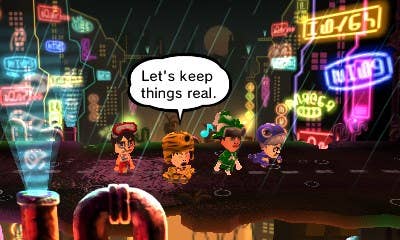
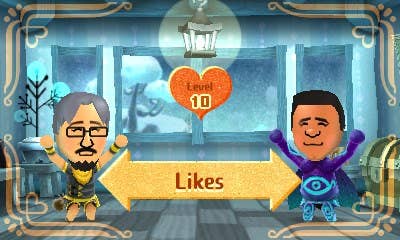
The roads are at least littered with events. For example on one road, a Mii might fall into a dark pit, and you'll lose them for the remainder of the road. (Comically, one will interject, "We'll meet you at the Inn!" to which an absent Mii down in a black hole will holler back, "Okay!") In another, a Mii might trip, allowing a friend to help them up and inching their relationship closer. These fleeting events are a reminder that this a journey shared between Miis, not just to pummel enemies and retrieve long lost faces snatched by the villain.
Miitopia has a core loop that it follows to a tee. You begin your journey alone, with only a Mii and a chosen class. At the start, only a select few classes are available—from the standard Warrior to the quirkier Pop Star. Later, as your squad bloats to four Miis and beyond, more classes become available. Eventually, Miis have the ability to adopt everything from a Cat class to a Princess class. As per story beats, even your protagonist Mii gets the opportunity to cycle through classes. Over the course of my game, I've been a Pop Star, Cat, and Princess; and so far, I've enjoyed being a Cat the best.
Despite around 30 hours sludged away so far in Miitopia, it still seemingly has a ways to go. Playing Miitopia has been an experience of being disappointed time and time again, watching the same handful of jokes play over repeatedly. You see the silly heart at the root of the game as it glimmers in weird combo attacks in the heat of battle, like a Tank class Mii launching another Mii out of their Tank-head. But then jokes are repeated, endlessly, and even the visual gags of Miis of Nintendo employees and others (of course Reggie is in one of my squads) grows tiresome overtime.
Miitopia isn't a terrible, awful game, it's just a bland one. For what's seemingly the swan song for Mii-centered projects outside of being buried in the Switch avatar menu, it's a complete bummer. The game suffers under the weight of oversimplification: where Tomodachi Life thrived with its reality show-like approach, Miitopia instead feels far too repetitive to capture the same whimsical spirit. There's humor and joy at the center of Miitopia, it's just humor and joy that we've seen so better executed through the facade of Miis in the past, and slapping an embellished Find Mii skin over what feels like half of the scripted scenarios for Tomodachi Life just makes me yearn for something better. Something more complete. Something, I dunno, to absorb my nights happily on the regular again.
Final Thoughts
The Cast-Your-Own-JRPG formula can only go on for so long. That's the core problem with Miitopia, a game that stretches its limits for hours upon hours, seemingly never running out of steam. It's a game where after you "beat" it, there's an entirely new, more freeing world to explore. There's islands you've never even skipped across yet. There's a new foe, hiding up on a cloudy peak. And for the first time over the course of the game's 30 and up hours, side quests are available. Side quests that pad out the main journey, but make it feel more like an adventure than ever before.
This sorta-post game, sorta-extended content is where Miitopia finally came into its own (it only took dozens of hours to get there). The whole gang (your entire gang 10-Mii strong crew, all reunited and no longer scattered). The humor was still tired; repeating the same gags and goofs for infinity, but the game at last emerged beyond its mostly automated combat to become a quest, a journey, an adventure. Finally, a JRPG.
If the humor hadn't worn thin, I would have felt elated finding this worldliness buried post-"final" (not really final) boss in the Traveler's Hub. Miitopia is a JRPG with so much game, arguably too much, and with a personality that's akin to your far removed cousin who frequents the likes of Know Your Meme and nothing else. There's still charm in Miitopia's opening hours: casting your combatants and the friends you make along the way as miscellaneous Miis, watching their antics, seeing characters and folks you'd never see interacting otherwise here bonding in bizarre ways.
Yet the game falls mostly flat by its end. In addition to its repetition, as soon as you feel like you're making progress the game yanks out the rug from underneath you, forcing you to rotate your core party and own class to throw something else into the mix. Initially, I found this to be a clever twist on class systems, forcing me to get out of my comfort zone and test something else for a change. But around the third time it happened, I was tired already. I was comfortable, strong, adequately powered. I wanted to remain that.
It's far too late in the game itself when flexibility is given to you. By that point, I was riding out to just see the end, to cast these Miis aside return them back to the probably-a-fire-hazard cramped apartment building in Tomodachi Life. I thought Miitopia would be a second chance to give those long-forgotten, goofy stand-ins for celebrities and characters. When instead, I only wished I could return them from whence they came, away from this repetitive purgatory.
I could see Miitopia feeling like a better game experienced in smaller doses, like a Street Pass experience—that is, not one committed to playing solely within a whirlwind deadline chase. It's light in all aspects of the word, even if it never commits on its endearing promise like Tomodachi Life once did. Miitopia, by its end, is too redundant, too bland, and saves its best parts for far too late in the game—in the post-game, assuming its players have stuck around that long to begin with.
Lasting AppealThere's <em>a lot</em> going on in Miitopia. I imagine for a completionist, a player's experience could crawl upwards of 60 hours. The problem is, with repetition (even with the ability to change character classes later on), it might struggle to capture your attention in the long stretch. Except maybe if you play in small doses slowly over time.
VisualsFor being a game about Miis, the locales change a lot across the journey. This isn't the best looking game on 3DS, but it shines in some spots.
ConclusionMiitopia feels like a missed opportunity. It's a game that starts and ends strong, but falters in the many, many hours in-between. Its jokes and gags quickly grew stale, and its charm wore off quickly. And then it kept going, for dozens of hours on end. I imagine if players are on the hunt for a game that's slightly more complex than what they'd find in Street Pass plaza, Miitopia might be that game for them. For players hunting for more hilarious and unpredictable antics from Miis like they once saw from Tomodachi Life, it seems like that dream remains just that. A dream.




